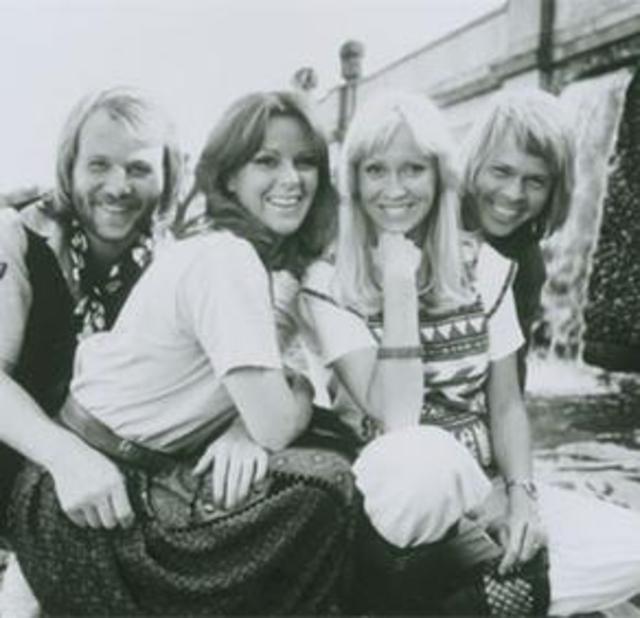ABBA

Agnetha Fältskog (vocals; born April 5, 1950); Benny Andersson (keyboards; born December 16, 1946); Björn Ulvaeus (guitar; born April 24, 1945); Anni-Frid Lyngstad (vocals; born November 15, 1945)ABBA rose out of Sweden in the Seventies to become one of the most successful and beloved pop groups in music history. Their success gave a more international flavor to popular music, broadening it beyond the English-speaking countries of origin. ABBA truly was an international phenomenon, topping charts and breaking records in England, France, Italy, Germany, Holland and Scandinavia. For a few years, ABBA ranked second only to automaker Volvo as Sweden's biggest money-making export.According to the RIAA, ABBA has sold more than 10 million records in the U.S. Estimates of worldwide sales range as high as 350 million. In the U.K. alone, these Swedish superstars charted 19 Top 10 singles (including nine that went to Number One) from 1974 to 1982. America proved somewhat more impervious to ABBA mania, as the group cracked the U.S. Top 10 only four times and hit Number One exactly once (with "Dancing Queen," in 1977). However, America got belatedly on board when the "jukebox musical" Mamma Mia!, based on the songs of ABBA, became a Broadway sensation. In December 2009, it became the 12th-longest-running Broadway show in history as it closed in on its 3,400th performance. Mamma Mia!, which premiered in London in 1999, has played around the world to an estimated 40 million people. A film version and accompanying soundtrack were released in 2008. All of this further fueled ABBA mania, which remains in high throttle three decades after the group's breakup in 1982.The seeds for ABBA's decade of infectious, effervescent pop were sewn in 1966, when Benny Andersson and Björn Ulvaeus met. The two were already rock stars in Sweden, where Björn played guitar with the Hootenanny Singers and Benny was keyboardist with the Hep Stars (referred to in their homeland as "the Swedish Beatles"), They made some records as a duo, using the name Björn and Benny. In 1972, they recorded one of their songs using Björn's wife, Agnetha Fältskog, and Benny's wife-to-be, Anni-Frid Lyngstad ("Frida," for short), as backing vocalists. Cut in a studio in Stockholm in March 1972, "People Need Love" was credited to "Björn and Benny, Agnetha and Anni-Frid," as the ABBA acronym had not yet been devised. (Technically, the first "B" in ABBA is backward, according to the band's copyrighted logo.) "People Need Love" became a Swedish hit and was issued in America on Playboy Records (an offshoot of the magazine), which peculiarly amended the credit to "Björn and Benny (with Svenska Flicka)" – meaning "Swedish girl."ABBA's breakthrough came in 1974, when their song "Waterloo" won the Eurovision Song Contest. It topped the charts in many countries, including Britain, and even hit Number Six in the U.S. With its ringing harmonies and surging melody, "Waterloo" recalled the tuneful, high-energy songs of the girl-group era and the British Invasion at a time when infectious pop songcraft was in short supply. There was much more to come from ABBA in this vein. A year after the success of "Waterloo," they scored again with "SOS," reaching Number Six in the U.K. and Number 15 in the U.S. ABBA became a fixture on the world charts.Their mounting success resulted in sustained chart feats of Beatles-like proportions. Over a six-year period, from late 1975 through early 1982, ABBA released 15 consecutive singles that placed in the U.K. Top Five. Eight of those were Number One hits: "Mamma Mia," "Fernando," "Dancing Queen," "Knowing Me Knowing You," "The Name of the Game," "Take a Chance on Me," "The Winner Takes It All" and "Super Trouper." The singles "Does Your Mother Know" and "I Have a Dream" just fell short, reaching Number Two. Four others stopped at Number Three: "Money, Money, Money," "Angeleyes/ Voulez-Vous," "Gimme Gimme Gimme (A Man after Midnight)" and "One of Us." All are driven by the soaring, harmonized lead vocals of Agnetha and Anna-Frid and the songwriting and production of Björn and Benny.From 1975 to 1980, ABBA spent 43 weeks atop Britain's album charts – a feat equaled by no one. By contrast, the group only topped the American album and singles charts once: in April 1977, when "Dancing Queen" hit Number One for a week. For this reason, as Billboard wrote, "the members of ABBA consider America to be their only failure." Even so, they placed 20 songs in the Hot 100 and have seen eight of their albums certified gold or platinum by the RIAA.In fact, much of ABBA's American success came belatedly, after their 1982 breakup. Internal tensions stemming from the divorces of the two couples recalled similar turbulence within Fleetwood Mac during the making of that band's Rumours. Agnetha and Björn separated in late 1978, and Benny and Anni-Frid split up in early 1981. They recorded their final album, The Visitors, before disbanding in 1982. Benny and Björn thereupon set about working on the musical Chess with Tim Rice, while Agnetha and Anni-Frid embarked on solo careers. ABBA has never regrouped.An ABBA revival in the Nineties was sparked by the incredible success of Gold – Greatest Hits, which has sold 26 million copies worldwide, including six million in America. The comprehensive box set, Thank You for the Music, was released in 1994. The musical Mamma Mia! came at the end of the decade and carried the ABBA revival into the new millennium. In 2002, Universal Music remastered and reissued ABBA's eight studio albums in expanded versions. An even more exhaustive box set, The Complete Studio Recordings, appeared in 2005. With ABBA's 2010 induction into the Rock and Roll Hall of Fame, ABBA mania will continue for years to come.